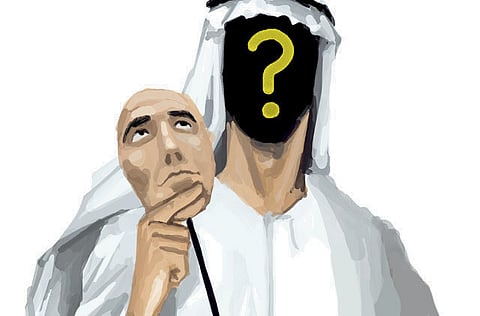UAE's identity crisis is a growing concern
The national language has been replaced in the case of the UAE with other languages

The issue of the Emirati identity has resurfaced again in the media, with reports that the population of the UAE has reached 8.3 million, according to the National Bureau of Statistics.
This news has raised eyebrows and posed many questions about the percentage of Emiratis in the UAE.
Are we suffering from an identity crisis?
The founder and leader of the UAE, Shaikh Zayed Bin Sultan Al Nahyan, left behind not only a modern country with no enemies, but also an orderly state and civil society that moves freely within a confederate government system — a society full of dreams, ambitions and achievements.
When the UAE was established, the country was faced with serious challenges, both internal and external. But the young nation was able to overcome those challenges thanks to the wisdom of the founding fathers of our Union. Then, all efforts were focused in the direction of nation-building and development.
The 1970s were the times of founding the Union. The 1980s were the times of stability. The 1990s were the times of development. The new millennium is the time for reaping the rewards.
After more than 170 years of British military presence in the region, it was the destiny of those seven Trucial States to unite, despite attempts by the occupier to divide and isolate the regions and tribes. The foreign forces eventually left but the Emirates remained. People and their rights always win in the end.
One of the major obstacles that faced the country at the beginning, was the tiny population and low education levels. The UAE adopted a comprehensive educational strategy and attracted some of the best Arab and foreign experts and workers to assist in the development process.
The boom in development projects brought in many expatriate workers. The number of foreigners has multiplied dramatically during the last 40 years. On the other hand, the percentage of Emiratis declined until it reached a point where they account for only 11 per cent of the total population, according to the latest statistics.
This demographic imbalance and the lack of clear legislations and policies to address this are a cause for concern in Emirati society.
There are socio-cultural and geopolitical dimensions to the presence of people from more than 200 different nationalities in the UAE. This poses a great risk to the identity of the country and its citizens. Frankly speaking, many in the conservative Emirati society suffer the repercussions of an identity crisis.
Cultural inventory
Most of the causes of this crisis are internal, and not external as some may think that we as Emiratis are the ones who brought in too many people from across the globe. They have come along with their cultures and habits. This won't affect us unless we want it to. There is no conspiracy against our society. Fear of other cultures is unjustified, especially given the deep Arab and Islamic culture in this country.
Cultivating a national identity among our younger generations requires sound education and upbringing. It is obvious we don't have a clear methodology for educating our children which has resulted in an identity crisis for a large section of our society. There is a division in the way families bring up their children. Some look towards the East, and some towards the West and others bring up their children according to their own limited knowledge and educational levels.
There is a vast cultural inventory in every Emirati house. It is an accumulation of the heritage of our parents and grandparents. This culture, like us, suffers from marginalisation in a society that is quickly changing. If this cultural inventory is used in the right way, it would help a great deal in shaping our national identity.
The national language, which is a main component of any culture, has been replaced in the case of the UAE with other languages. Learning the national language is part of the belonging process. It helps the person learn about his or her culture and know its heritage and history. How would a generation that hasn't learned its mother tongue have a sense of belonging?
Our children are more fluent in foreign languages than in their mother tongue. I am not against learning other languages. Rather I am against ignoring Arabic and treating it as a second language.
My friend tells me that the pace at which our society has changed is faster than our ability to adapt. I ask him "How?" He replies that the civil and societal developments of the past 10 years have rapidly changed the face of the country. He says that we are not against change and modernisation, adding "We are against unregulated rapid change".
Sociologists and anthropologists say that multicultural societies have a better future. We might argue about the concept. Yet, we agree that there is an identity crisis that needs to be addressed in a clear and transparent manner.
Many Emiratis feel comfortable and regain their sense of belonging and loyalty when they go out to the desert, far from civilisation. In the cities, however, they don't find that same comfort. They feel they are aliens and they don't belong to the place. Cities don't look like them.
Jamal Al Shehhi is an Emirati writer.


